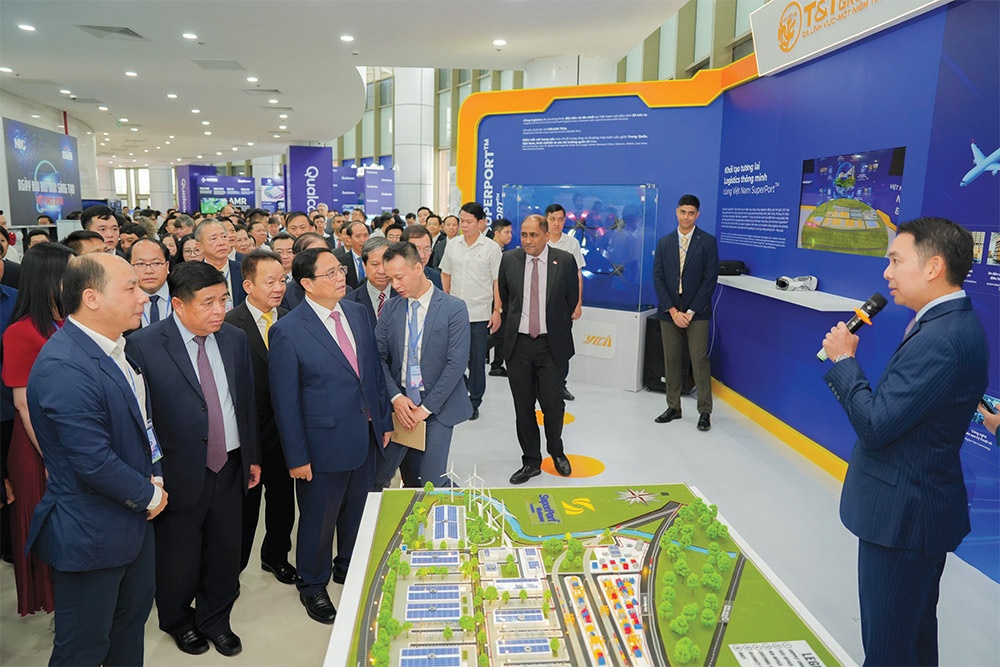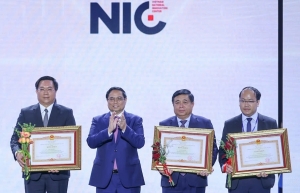Conditions being created for innovation breakthroughs
 |
| Conditions being created for innovation breakthroughs |
At last week’s conference on enterprises and the young generation amid the rise of AI and semiconductors, held during Innovate Vietnam 2024 and the fifth anniversary of the National Innovation Centre, Minister of Planning and Investment Nguyen Chi Dung emphasised that Vietnam stands at a crucial juncture.
“Vietnam has gathered the conditions to be ready to welcome and cooperate with businesses and investors from all over the world in the semiconductor industry and AI,” he stated.
The country has successfully built a substantial semiconductor and AI ecosystem in the region, attracting participation from major global players such as Google, Meta, Nvidia, Qualcomm, and Intel, along with other high-tech firms in the electronics sector.
On the government side, policies and laws are being fine-tuned to create the most favourable environment for high-tech enterprises in semiconductors and AI. Minister Dung revealed that a decree on establishing, managing, and utilising the Investment Support Fund will be issued by the end of 2024 to assist enterprises in these fields.
AI and semiconductor technologies are changing the world and Vietnam cannot stay out of this game,” the minister said. “Specifically, AI technology is creating new solutions for many fields like healthcare, education, agriculture, and manufacturing, while the semiconductor industry is the foundation for the development of AI. Vietnam has well aware of the important role of these two fields and is proactively building a sustainable development ecosystem.”
Government collaboration
Becky Fraser, vice president of Qualcomm’s Government Relations, said that on-device AI will change lives.
“Moreover, on-device AI is getting safer, more sustainable, and more stable. Additionally, it contributes to reducing the energy consumption of large data centres and increasing the efficiency of cloud computing,” Fraser said.
So far, more than 2.5 billion AI devices have been shipped around the world. GenAI is also applied on numerous devices with functions like live translation, photo portrait generation, photo editing, writing assistance, and more.
“The partnership between Vietnam and Qualcomm is getting closer in terms of innovation incubation, technology investment in Vietnam, enabling the country original equipment manufacturers, and collaborating with the government,” Fraser said. “For over 20 years, Qualcomm has been a dedicated partner in Vietnam’s digital transformation journey, as the country continues to innovate, upgrade and digitise.”
Ettikan Karuppiah, director and technologist for Nvidia’s Asia-Pacific region, emphasised that the next wave of GenAI will be a revolution. He said that the company is trying to connect creators to participate in this process. Accordingly, many inventions have appeared thanks to GenAI, in Vietnamese companies have also created many AI products with commercial value.
“Nations are investing to build up domestic capabilities and infrastructure across the stack like AI-ready workforces, models, and data, as well as factories,” Karuppiah said. “At the top is the policy imperative and national outcomes – recognising that this is not about AI or technology, but the future of their economy.”
AI can be used to automate tasks and improve decision-making in areas like public policy and resource allocation, healthcare, and drive innovation across industries, he added.
“Today, 70 nations have an AI strategy in place. But that’s not enough. There are a few other ingredients needed. A good regulation framework is needed to ensure that AI benefits people,” Karuppiah added.
Meta’s Global Affairs president Nick Clegg also said that Vietnam continues to be an important country for Meta. “We are committed to supporting Vietnam as it strengthens its position as a digital economy leader through the government’s Industry 4.0 initiative,” he said.
Specifically, Meta will soon begin testing Meta AI in Vietnamese, which will allow the company’s AI tools to be accessible in the local language. “Business AI for Messenger will fully launch in the coming months, even earlier than launching in Europe. These initiatives are part of a broader effort to help Vietnamese businesses and developers tap into AI technology and leverage it for growth and innovation,” Clegg added.
Tran Dang Hoa, chairman of FPT Information System and FPT Semiconductor, noted that Vietnam is converging better conditions for AI and semiconductor development, with industry projections aiming for $1 trillion growth by 2030. However, he also pointed out significant challenges related to human resources, including a shortage of specialised engineers, outdated training programmes, and a lack of qualified lecturers.
“Vietnam’s current workforce in the semiconductor and AI fields is significantly smaller compared to regional competitors. India’s workforce in these industries numbers between 125,000 and 200,000, while Singapore has 33,000 professionals,” Hoa said.
Active engagement
Vietnam aims to build a workforce of about 50,000 semiconductor professionals by 2030. To bridge this gap, the government and local authorities are working on measures to engage investment and develop human capital. The Law on Digital Technology Industry provides tax incentives, land-use support, and financial assistance for research and development and training centres, supporting the growth of these industries.
FPT Group is also prioritising human resource development in semiconductors and AI through various initiatives, including FPT University, FPT Polytechnic, and FPT Academy International. These institutions offer programmes in chip design, AI, embedded systems, and semiconductor technologies, while the FPT AI Centre in Quy Nhon serves as a hub for AI-driven workforce development and international collaboration.
Hoa also called for collaboration in developing Vietnam’s semiconductor and AI talent, proposing joint training programmes, investment in training facilities, and knowledge exchange to strengthen the industry’s human resource base.
With strong support from the government and active engagement from the private sector, Vietnam is well-positioned to become an innovation hub for AI and semiconductors. In line with this, the US government has selected Vietnam as one of six countries to participate in the International Technology Security & Innovation Fund.
Additionally, Vietnam is also strengthening cooperation with Japan, South Korea, Europe, and Taiwan to train human resources and further develop its semiconductor and AI capabilities.
| Nguyen Chi Dung, minister of Planning and Investment Vietnam has built the conditions to be ready to welcome and cooperate with businesses and investors from all over the world in the semiconductor and AI industries. Specifically, the country has a stable political system and high determination in promoting innovation and high-tech industries, as well as a large population. The nation has chosen to develop the semiconductor and AI industries to develop alongside developed countries. Vietnam issued a strategy for AI development in 2021 as well as a national strategy for the semiconductor industry and related human resource development towards 2030. The Ministry of Planning and Investment has coordinated with authorities and domestic and international partners to promote the training of high-quality human resources to participate in the semiconductor and AI industries, to achieve the goal of training 50,000 engineers by 2030. Vietnam has now formed a large-scale semiconductor and AI ecosystem in the region with the participation of the biggest tech companies in the world and many high-tech enterprises in the electronics industry. Vietnam has also gradually improved the system of investment policies and laws to create the most favourable business environment for high-tech enterprises. The government will soon issue a decree on the establishment and management of the Investment Support Fund to support investment for enterprises in these areas. We have also established a national steering committee for the development of the semiconductor industry, as well as a national innovation centre and three high-tech parks in our three biggest cities, ready to welcome semiconductor investors with high incentive mechanisms. |
 | Vietnam to become a country of origin of innovation Prime Minister Pham Minh Chinh highly appreciated the initial success of the National Innovation Centre at its fifth anniversary celebrations and the official opening of Innovate Vietnam 2024 on October 1 at Hoa Lac Hi-Tech Park in Hanoi. |
 | Ericsson and MobiFone collaborate on 5G Innovation Hub Ericsson and MobiFone signed an MoU on October 2 to jointly establish a 5G Innovation Hub at MobiFone’s premises in Vietnam. |
 | The future of AI in business: integrating technology with human oversight Sylvester Kinuthia, head of transaction banking at Standard Chartered Bank Vietnam, delves into the opportunities and challenges of AI application in business, and how Standard Chartered works to ensure effective and ethical AI deployment. |
What the stars mean:
★ Poor ★ ★ Promising ★★★ Good ★★★★ Very good ★★★★★ Exceptional
 Tag:
Tag:
Related Contents
Latest News
More News
- Hermes joins Long Thanh cargo terminal development (February 04, 2026 | 15:59)
- SCG enhances production and distribution in Vietnam (February 04, 2026 | 08:00)
- UNIVACCO strengthens Asia expansion with Vietnam facility (February 03, 2026 | 08:00)
- Cai Mep Ha Port project wins approval with $1.95bn investment (February 02, 2026 | 16:17)
- Repositioning Vietnam in Asia’s manufacturing race (February 02, 2026 | 16:00)
- Manufacturing growth remains solid in early 2026 (February 02, 2026 | 15:28)
- Navigating venture capital trends across the continent (February 02, 2026 | 14:00)
- Motivations to achieve high growth (February 02, 2026 | 11:00)
- Capacity and regulations among British areas of expertise in IFCs (February 02, 2026 | 09:09)
- Transition underway in German investment across Vietnam (February 02, 2026 | 08:00)






















 Mobile Version
Mobile Version